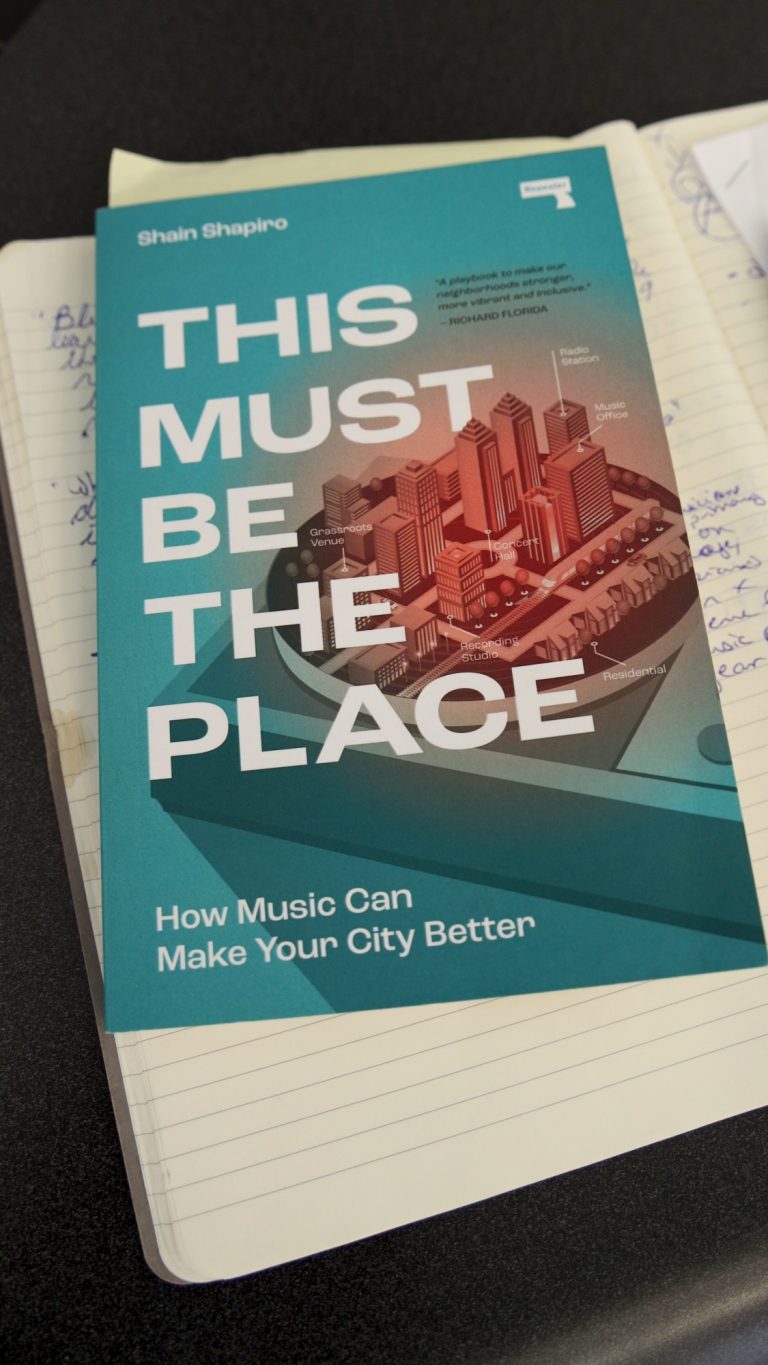The Music City book launch and panel discussion coincided with the opening of Oktoberfest 2023. On my way over, I was introduced to Marit Styles, leader of the opposition in Queen’s Park, and just missed seeing the Prime Minister of Canada. I spotted our mayor mingling with the crowd, looking especially jolly decked out in lederhosen. He was going my way: to the SDG Idea Factory to hear about how music can make our city better.
A project of Midtown Radio, the event was centred around the presence of music and cultural policy consultant Shain Shapiro, who is on tour promoting his first book, This Must Be the Place: How Music Can Make Your City Better. If you missed it, you can hear what was said on midtownradio.ca under Midtown Conversations.
The emphasis here is on what Shapiro refers to as the music industry, or the “nighttime economy.” Nashville, Austin and New Orleans have set the standard for what a “Music City” can be. According to Shapiro, it’s a model that can be adapted by almost any city. To foster a vibrant music ecosystem, consideration of the distinct needs of the industry and appreciation of the benefits it can bring must become an integral part of all aspects of city planning.
News about the Kitchener-Waterloo Symphony board declaring bankruptcy and ceasing operations was still fresh on our minds at that point. The panel discussion began with Betty A. Keller, producer of the phenomenally successful local music documentary Rock This Town. The first thing she mentioned was the plight of the 52 professional musicians who had lost their livelihoods. But that was it; the subject didn’t come up again in any of the remarks from the panel, nor in the lively, but all too brief discussion that followed.
That’s because this was a “rock this town” kind of crowd. The main focus was the local and regional indie music scene, which Midtown Radio has done such great service to our community in showcasing. Craig Norris at CBC-KW covers similar terrain, as does Coral Andrews at 98.5 CKWR. Beyond that, media attention is sparse. I’m also not aware of any organization that serves or represents this segment of the regional music ecosystem.
It was great to see Cory Crossman there, an extraordinary leader in the indie music scene that we ended up losing to London. He has been instrumental in earning London the distinction of becoming Canada’s first UNESCO City of Music.
But Music City wasn’t all indie music. I recognized people from local jazz and blues circles. The assembly also heard comments from Sam Nabi, the mayor of hip hop in Waterloo. What struck me, though, were those who were absent. I didn’t see anyone from the spectrum of musical forms covered by The Music Times: chamber, experimental, new, orchestral, vocal.
The Waterloo-Wellington classical music scene extends into sacred or church music, which remains remarkably vital, as well as the rich range of community choirs, bands, orchestras, musical theatre organizations and venerable citizens bands. Altogether, these elements constitute a formidable presence in our communities.
Despite what’s going with the KW Symphony, this is an area in which we have always excelled. I can’t think of anything else that distinguishes us in the same way that this musical legacy does. Since it is attributable, in large measure, to the continental German strain in the “Waterloo Way,” it is a far more authentic and meaningful expression of this part of the culture of our region than Oktoberfest can ever be.
The kind of music that Neruda Arts presents at Kultrún and All That Wordly Jazz was also not a noticeable presence—global indigenous, multicultural, and what they call world music (isn’t it all world music, human music?). This extends into the range of global traditional and folk music featured in the now gone but not forgotten Mill Race Festival of Traditional Music that once distinguished Galt so effectively. The polka and waltz flavours of Oktoberfest also belong in the category.
The Music City discussion left me better informed on aspects of the music industry I had known little about. I also came out of the room inspired. We could benefit from more of these conversations, especially if we set out to broaden the circle and work towards an All Music Cities approach that would be applicable in all the places and spaces in any city or town. Waterloo is, after all, a plural urban entity.
To get there, we’d be wise to avoid trite binaries: old school vs new; mainstream vs grass roots; established vs emergent; high vs low; art vs entertainment; serious, challenging and provocative vs easy listening. Music as an industry is a key consideration, but music as an integral part of the community also needs to be taken into account. Music presenting and recording are part of the picture, but so is the participatory side of the equation: learning and making music, and dancing to it.
I’m not talking about amalgamation, or a fusion of energies. It’s the differences between the various strains that makes the prospect of an All Music Cities approach so attractive. The pursuit of harmony, when the opportunity arises, is the way forward, and that includes encouraging non-destructive rivalry and appreciating dissonance.

